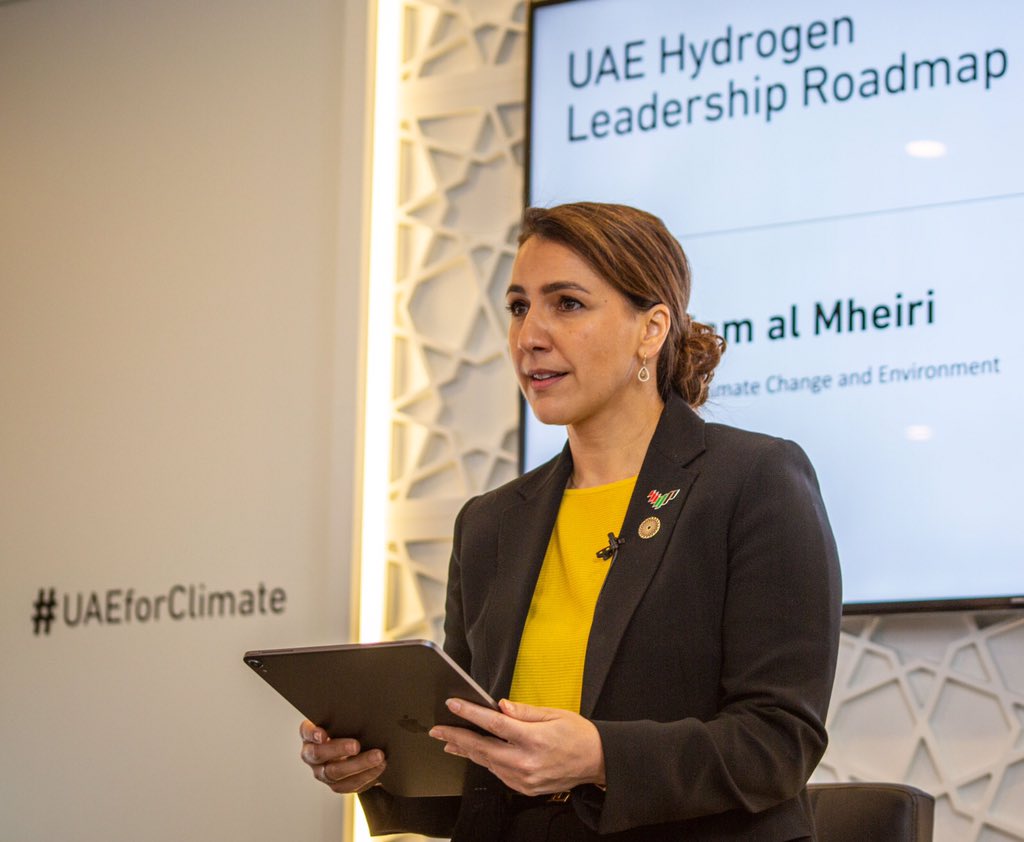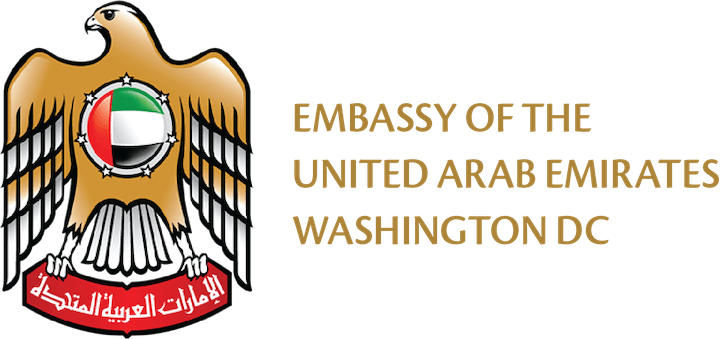The UAE is ranked as a leading country in gender equality in the region, according to the World Economic Forum’s 2024 Global Gender Gap Report. This achievement comes from the fundamental belief that women and men are equal partners in society. Through a series of public and private sector initiatives, women in the UAE are playing an increasingly stronger role in business, government and STEM fields.
Demonstrating the UAE’s leadership in women’s financial inclusion, political participation and justice, the UAE is ranked 22nd among 170 countries in the Georgetown Institute for Women, Peace and Security’s 2023 WPS Index.
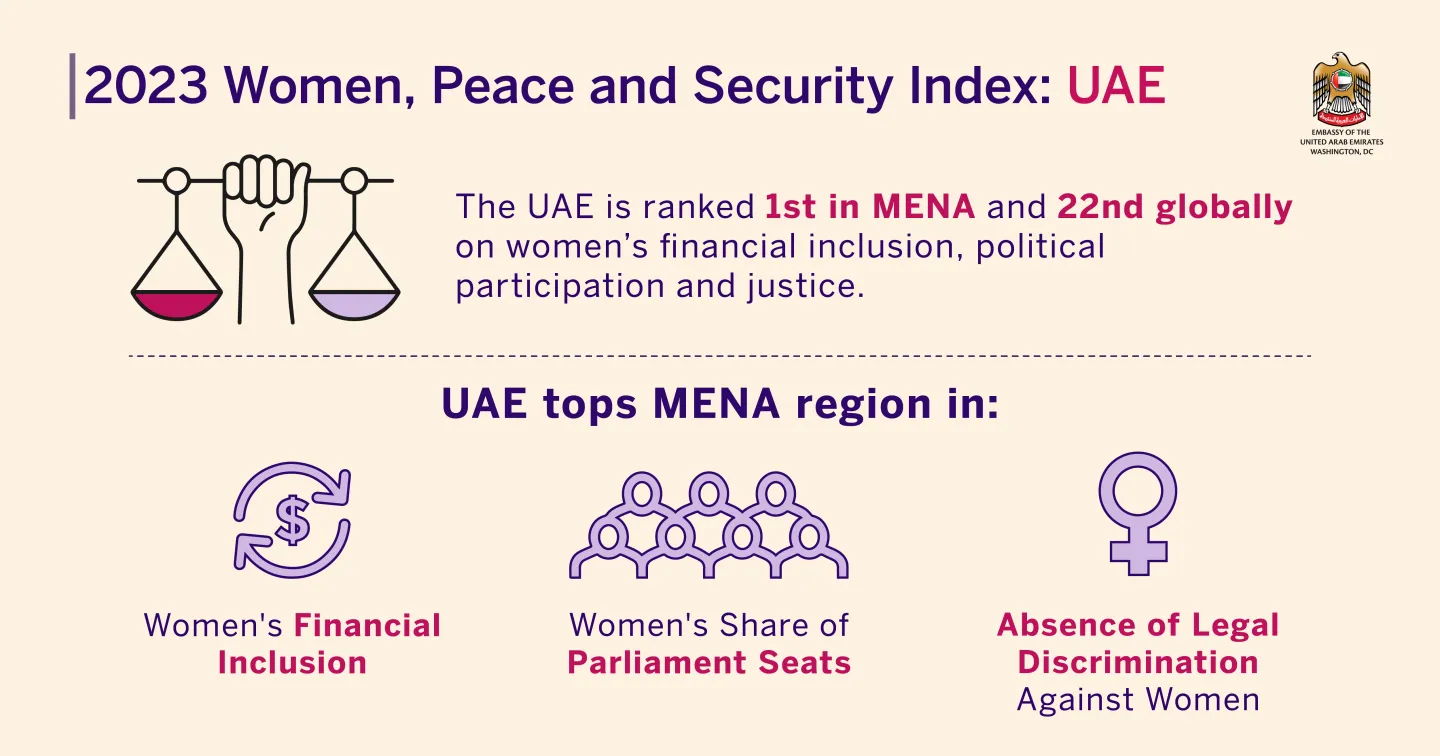
Gender equality is of paramount importance in the UAE, and the Constitution of the UAE guarantees equal rights for both men and women. Under the Constitution, women enjoy the same legal status, claim to titles, access to education, the right to practice professions, and the right to inherit property as men. Women are also guaranteed the same access to employment, health and family welfare facilities. As a leader of equality in economics, government, education and health, the UAE has been named one of the region’s pioneers.
Equality in Education and Literacy
Today, more women than men complete secondary education and enroll in university and post-graduate institutions.
- 77% of Emirati women enroll in higher education after secondary school and make up 70% of all university graduates in the UAE.
- 56% of UAE government university graduates in science, technology, engineering and mathematics (STEM) are women.
- The literacy rate of women in the UAE is 95.8%.
- In September 2014, the UAE opened the region’s first military college for women, Khawla bint Al Azwar Military School. The state-of-the-art military college provides world-class training, physical fitness sessions and leadership development. The UAE has four women fighter pilots and has also trained over 30 women to work with the country’s special security forces.
Women in Business
Women in the UAE participate actively in the private sector in various roles. They have equal rights to economic resources, including guaranteed equal pay, as well as access to ownership and control over land and other forms of property, financial services, inheritance and natural resources, in accordance with national laws.
- The UAE had the highest number of women on Forbes' 100 Most Powerful Arab Businesswomen in 2023 and the second highest in 2024 with 14 Emirati women on the list.
- Women business-owners account for 10% of the total private sector in the UAE.
- 23,000 Emirati businesswomen run projects worth over AED50 billion, and occupy 15% of the positions in the boards of chambers of commerce and industry nationwide.
- In 2021, the UAE Security and Commodities Authority issued a mandate that listed companies must have at least one woman on their board of directors.
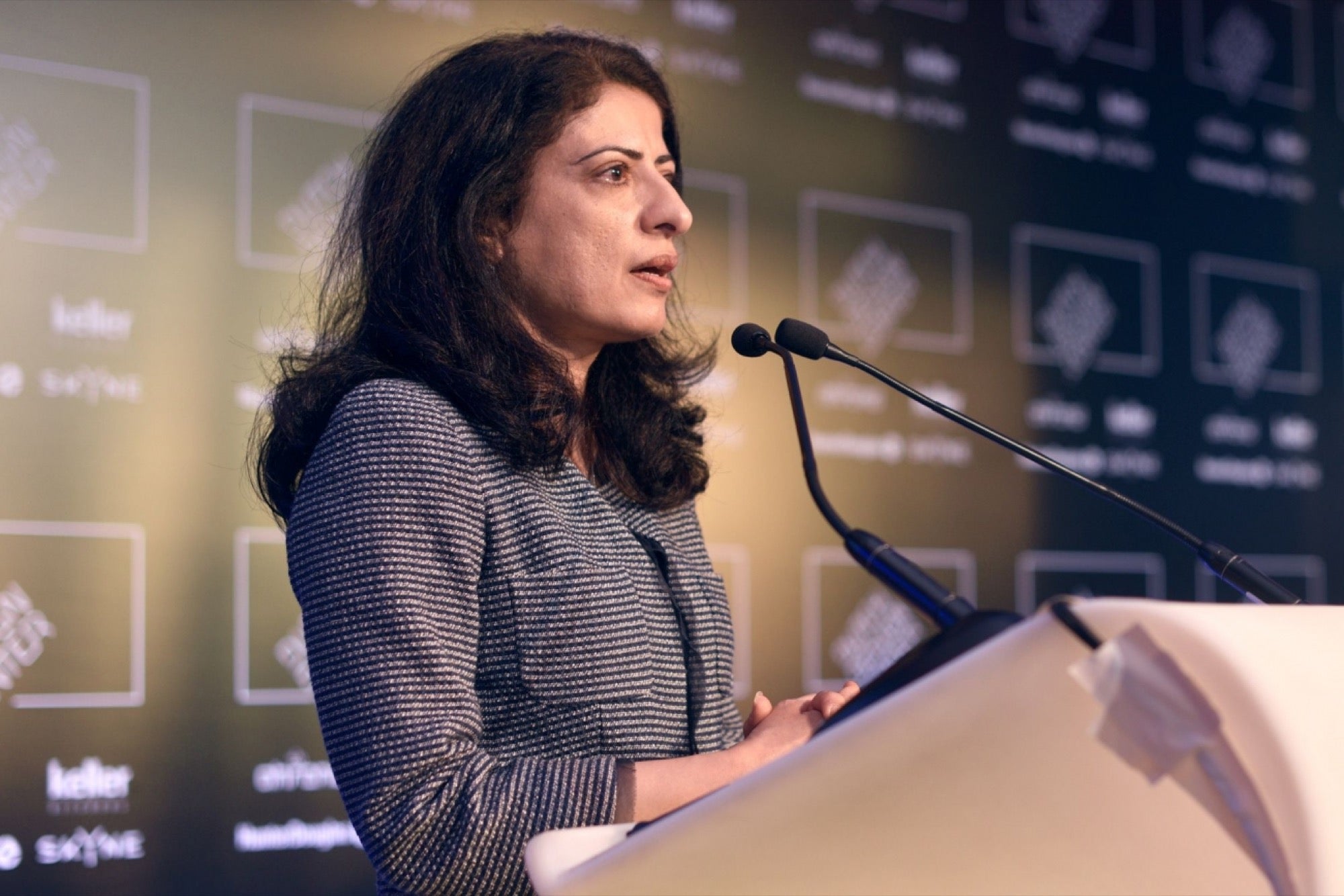
Women in Government
Women’s participation is particularly strong in the public sector. In fact, women hold two-thirds of public sector jobs in the UAE, with 30% in leadership roles and 15% in technical and academic roles. As the only country in the MENA region that has achieved parity at the parliamentary level, the UAE is ranked 40th globally for advancing women’s political empowerment, according to the World Economic Forum’s Global Gender Gap Report 2024.
Additionally, women actively engage in diplomacy, making up 20% of the diplomatic corps with seven Emirati women appointed as ambassadors and consuls general.
Highlighting the importance of gender in policy dialogue, the UAE’s Gender Balance Council is a federal entity responsible for developing and implementing initiatives and projects to enhance gender balance. The Council aims to reduce the gender gap across all government sectors and achieve gender balance in decision-making positions.
Nine women serve in the UAE Cabinet—including HE Shamma Al Mazrui, who serves as Minister of State for Community Development. When she was appointed as Minister of State for Youth Affairs at the age of 22 in 2016, she became the youngest minister in the world.
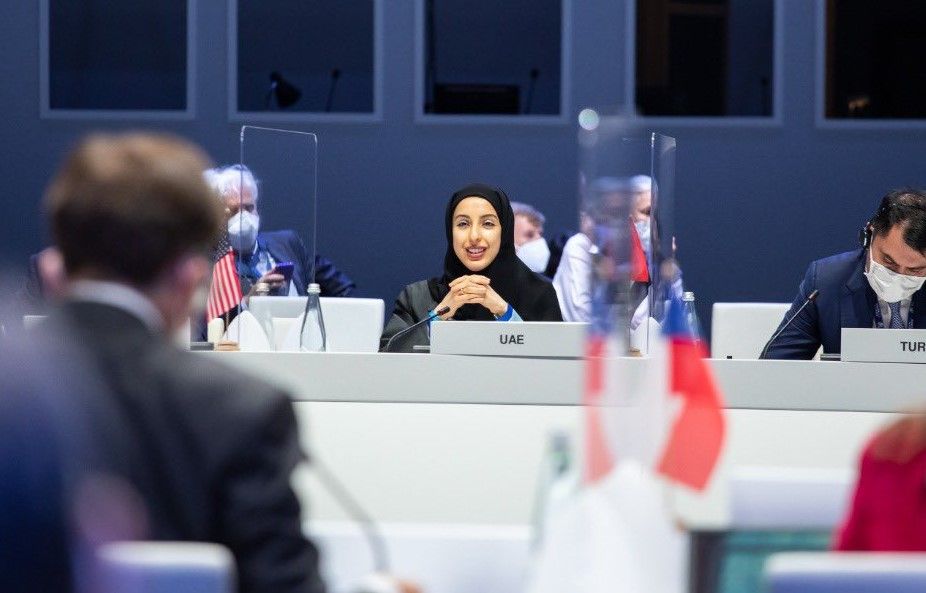
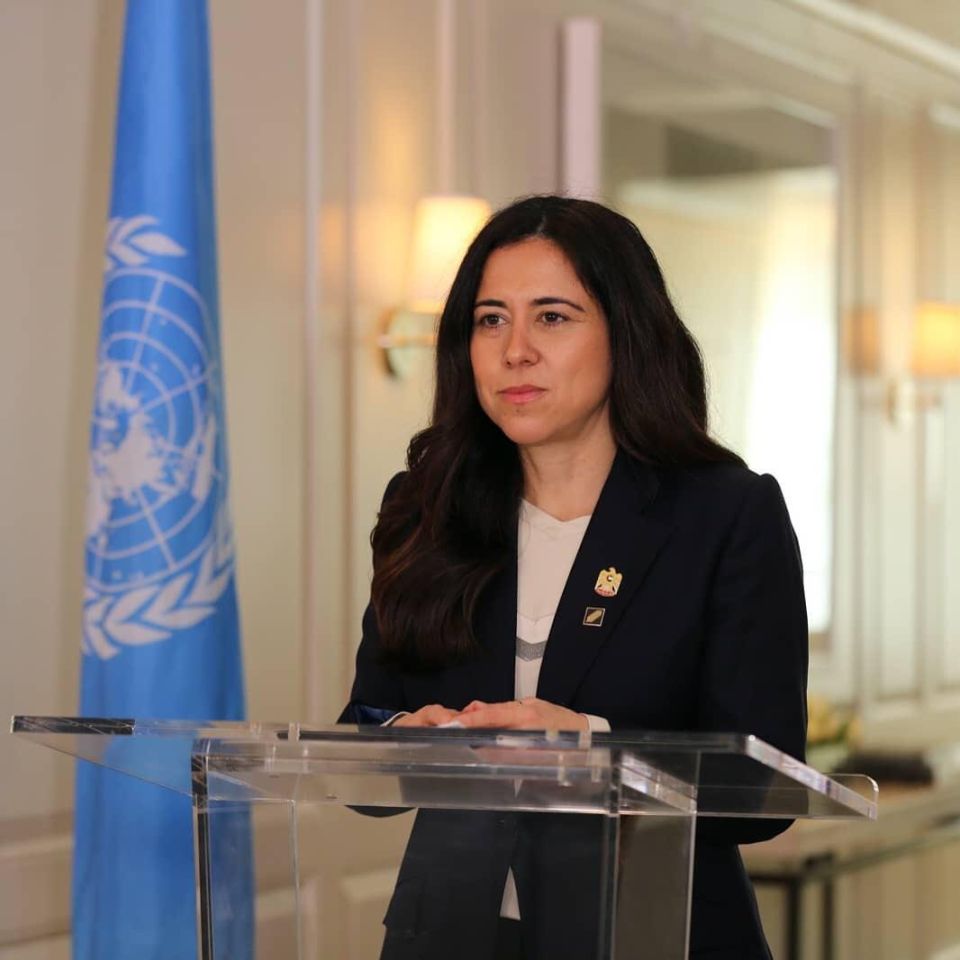
In 2013, Her Excellency Ambassador Lana Nusseibeh became the UAE’s first female Permanent Representative to the UN and the fifth woman in the country to serve as an Ambassador, a position she held until 2024. During her ambassadorship, Nusseibeh was elected President of the UN Women Executive Board in 2017, the first Arab female president to lead the Board. Ambassador Nusseibeh was also elected as Vice President for the 2017 United Nations General Assembly, representing the Asia-Pacific Group of Member States, and led the UAE’s Presidency of the UN Security Council in 2022. Currently, Nusseibeh serves as the UAE Assistant Minister for Political Affairs and Envoy of the Minister of Foreign Affairs.
Women comprise 50% of the Federal National Council (FNC), the UAE’s consultative parliamentary body. According to the IMD World Competitiveness Yearbook 2024, the UAE ranked second in the female parliamentary representation index.
In November 2015, Dr. Amal Al Qubaisi was appointed President of the FNC, making her the first woman in the region to lead a national assembly. She served in the position until 2019. Dr. Al Qubaisi had previously made history in 2006 as the first elected female to the FNC and in 2011 was appointed deputy speaker of the FNC.
In 2008, the first female judge in the UAE was sworn in. In 2019, two female judges were appointed to the Federal Judiciary for the first time, while in 2021, Dubai swore in its first female common law judge. Many women now serve in courts across the country as judges, public prosecutors, and marriage officials.
Women in STEM
Women are the driving force behind the UAE’s initiatives on the cutting edge of science and technology. From space and medicine to climate and food security, Emirati women in STEM are blazing new trails.
HE Sarah Al Amiri, UAE Minister of State for Public Education and Advanced Technology, shares, “Most science graduates in the UAE are women, and 50 percent of our employees at the space program are women. So we don't usually see the same trend of inequality that you see globally.”
In the field of engineering, Fatima Al Kaabi received the UAE Pioneer Award and was recognized as the youngest Emirati inventor at the age of 15. Today, Al Kaabi is studying computer engineering and encourages young girls to connect with female leaders though mentorship programs.
“AI is going to play a major role in our future and we need girls’ and women’s insights to make it work for our benefit. We need women to create things that fit our needs as a society and without their contributions, many of our needs might be ignored or misrepresented,” Al Kaabi says.
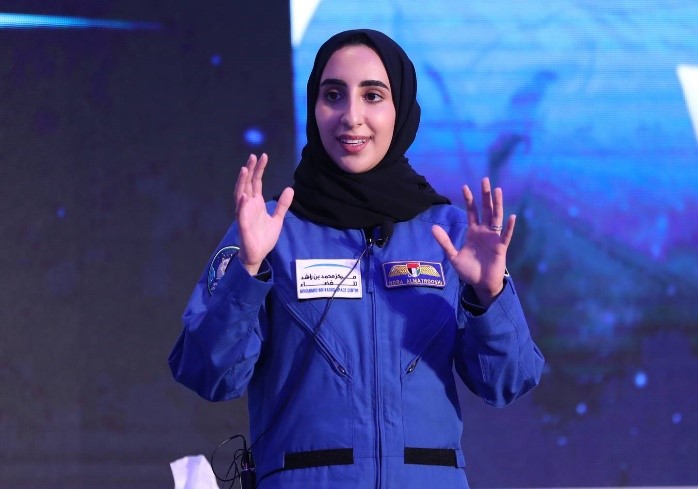
Meeting and Exceeding International Standards
In 2004, the UAE became a signatory to the United Nations Convention on the Elimination of All Forms of Discrimination Against Women (CEDAW). The UAE regularly participates in and hosts international conferences on women’s issues and has signed all international treaties on protecting the rights of women. Among these are the Child Protection Convention (1997), the Convention on the Elimination of All Forms of Discrimination against Women, CEDAW, (2004), the Hours of Work (Industry) Convention (1982), the Equal Remuneration Convention (1996), the Convention concerning Night Work of Women Employed in Industry (1982) and the Convention on Minimum Age (1996).
The UAE has also provided support for women’s empowerment programs through multilateral institutions. In 2016, the UAE opened a regional office for UN Women in Abu Dhabi, the first in the region. It has donated over $26 million to the organization since its founding in 2010 and ranked first in the Arab world and tenth globally in resource contribution in 2020. In November 2017, the UAE pledged $50 million to the World Bank’s Women Entrepreneurs Finance Initiative fund.
